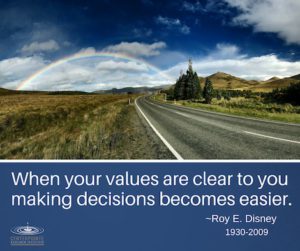How To Have It All, Part 2: Small Change, Huge Returns (Part 1 of 2)
by Marc Gilson, Director of Client Services, Centerpointe Research Institute
 You may recall that in Part One we highlighted some of the advice and feedback a young man just beginning a new job received in an online discussion forum. He had asked for tips on how to succeed as he embarked on his new job. While there were some practical bits of wisdom offered, most of it seemed a touch cynical.
You may recall that in Part One we highlighted some of the advice and feedback a young man just beginning a new job received in an online discussion forum. He had asked for tips on how to succeed as he embarked on his new job. While there were some practical bits of wisdom offered, most of it seemed a touch cynical.
There is a cost to success, it’s not something ever just handed to you. But the feedback in this particular forum discussion seemed to imply that health, sleep, trust, even happiness itself should come second if you really want to succeed.
This got me wondering whether success and happiness could ever really go hand-in-hand or whether it was usually a matter of choosing one over the other.
Then I introduced you to Chris, a client and friend of mine who seemed to “have it all” when it comes to the usual benchmarks of success. Wealthy, highly educated, respected and admired, and blessed with a wonderful family, Chris should have been one of the happiest guys around. But he wasn’t, and he (and I) wanted to know why.
Let’s pick up Chris’ story as we learn what he discovered and how it transformed his life.
Chris had already been using Holosync® meditation technology before he and I began our coaching work together. So he was beginning to experience some good breakthroughs and shifts. One of those shifts caused him to come face-to-face with the realization I mentioned a couple of times already:
He was not happy, even though he (and everyone else) thought he should be.
So he began to ponder this, and to cultivate his awareness through careful examination and meditation with Holosync®. At the same time, he and I embarked on some coaching around Chris’s past.
Slowly, something important began to emerge from our sessions and Chris began to realize something about his life – something that went to the very core of his upbringing and that had been overlooked throughout his life.
He realized that the source of his internal motivation – his drive to succeed – was not really his. It was his father’s.
Now, we all know of people who succeed because a parent or authority figure has pushed them to do so. And not every such instance results in the kind of unhappiness Chris was experiencing.
But Chris had grown up in the shadow of a father who saw a certain kind of success as the true measure of a person.
His father taught Chris many valuable lessons about how to succeed, some of it very similar to the feedback in the comments I shared at the beginning of Part One of this article:
- Keep your personal life personal
- Show up no matter what
- Set your alarm early
- Work hard
- Skip lunch, etc.
But Chris’s father shared very few lessons about how to be happy. Perhaps he himself wasn’t as happy as he could have been.
Or maybe he, like many others, assumed that success naturally generates happiness.
 Whatever the case, Chris was facing what we call a “values conflict.” I’m not talking about moral values here like “don’t steal.” In this context, a value is simply something that is important to us, so important that we make choices in our lives to make sure these values are acknowledged, protected, and maintained. We all have these values, some are overt (sometimes called “conscious filters”), some covert (sometimes called “unconscious filters”).
Whatever the case, Chris was facing what we call a “values conflict.” I’m not talking about moral values here like “don’t steal.” In this context, a value is simply something that is important to us, so important that we make choices in our lives to make sure these values are acknowledged, protected, and maintained. We all have these values, some are overt (sometimes called “conscious filters”), some covert (sometimes called “unconscious filters”).
Most of us, for example, would rank “family” as very high on our list of values, along with “health,” “financial stability,” etc. Those are common examples of overt values; things we can easily point to that generally seem to make sense to us and be pretty obvious in terms of importance.
Covert or unconscious values are a different breed.
They tend to be things that are truly, deeply important to us but that we don’t really let out into the light of day. They remain hidden or boxed up and are kept mostly to ourselves. In fact sometimes these sorts of values are so covert that we’re not even aware of them.
They exist in the shadowy world of the unconscious.
Covert values can sometimes surprise us when we uncover them, and yet we also often have an immediate sense of recognition when we do. Sort of like finding a beloved toy from your childhood in the attic. Even though you’d forgotten all about it, it is thoroughly familiar to you the moment you see it again.
Chris discovered that he’d stumbled into a values conflict by adopting his father’s overt set of values and committing himself to them. And in so doing, he had repressed many of his own covert values. These values, these subtle, hidden things that were important to Chris took a backseat to what appeared to be “more important” things.
Much of what we do in life – the choices we make and actions we take – are done in keeping with our overt values; those values we consciously know about. But covert values require our attention as well. In fact, when we ignore them, or have simply repressed them for so long we don’t even realize they’re there anymore, they can lead to a values conflict, or worse, dysfunction.
When your behaviors and values are at odds, you will experience conflict. It could be an inner conflict where you feel at odds with yourself, or an outward one in which your relationships with others suffer. Or it could be both.
In Chris’s case, the values conflict stemmed from the fact that he had never taken the time to identify or acknowledge his own values, causing many of them to become covert.
In a sense, he never had to examine or define his values because his father had been so good at providing Chris with a prefabricated, tested, and seemingly complete set of values already. So Chris did what a lot of people would naturally do in that situation: he adopted his father’s values and began to build a life around them.
When we adopt someone else’s values – their list of “what’s most important” – we put ourselves at risk of being unhappy because we spend our time working on behalf of values we may or may not share with that person. Even if we do share many of the same values, we aren’t grounded enough in our own internal reasons (because we haven’t had all the same experiences) for why we share those values.
This is why so many of our accomplishments and victories can feel hollow.
